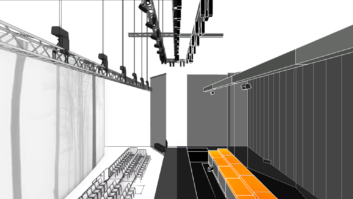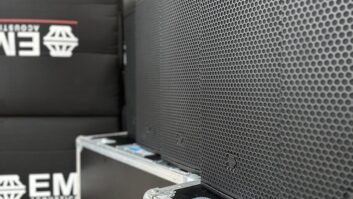
The coronavirus pandemic has had a very tangible impact on the broadcast and event sectors. Production of top TV shows has been suspended, major festivals and concerts have been cancelled or postponed and sporting schedules are in limbo. Less obvious is what effect Covid-19, the illness caused by the virus, is having on the manufacturing industry, which provides the equipment that would have otherwise made these events happen.
Like other companies, pro audio manufacturers are monitoring the situation carefully to ensure they can continue to supply their customers and that their workforce is kept healthy and safe. Very few manufacturing set-ups are completely self-contained. Most rely on other suppliers for at least some of their components and in these days of tighter margins many organisations have outsourced some of the manufacturing process to reduce costs.
A lot of European pro audio companies have for some time been buying in components from Chinese OEM (original equipment manufacture) firms. These include electronic circuit boards and chips, microphone capsules and loudspeakers cabinets. Because China was the first country to report mass coronavirus infections, leading its authorities to lockdown both business and social activities, there was the potential for western manufacturers of all types to be seriously affected as production slowed.
A few manufacturers found themselves in the opportune position of having stocked up before the seriousness of conditions in China became apparent. “We were fortunate that ahead of the situation in China we had brought forward orders because of Chinese New Year,” explains James King, director of marketing at Martin Audio, who adds that the company’s manufacturing process has been affected “only in a limited way.”
You may also be interested in:
- Why the world needs cloud-based collaboration tools now more than ever
- The hygiene factor – keeping your AV equipment clean
TSL Products similarly had placed orders with Chinese suppliers before the coronavirus took hold in the country. “We haven’t been affected to a great extent at the moment,” comments operations director Graham Degg. “We have effective and tight partnerships with our key suppliers based around consignment stocking arrangements. That’s not to say there haven’t been some impacts. Bare printed boards are being re-sourced closer to home, with a small uplift in cost and lead-time. Many UK circuit board manufacturers are currently very busy.”
Degg adds that conditions in China appear to be “normalising”, with its major supplier there back up to 80 percent capacity. Other European companies confirm that Chinese production is starting again. “”Many of our Chinese partners have now resumed production,” says Peter Claussen, chief operating officer of the Sennheiser Group. “Although we still do not anticipate any delivery problems for the next few weeks, we are very closely monitoring the delivery capacities of our Chinese suppliers. We are constantly aligning with our production partners and have taken preventative measures to help mitigate potential delivery shortages that might occur if the situation worsens.”
Coronavirus has been classed as a pandemic, meaning it is not confined to any one country or area. For manufactures this means that supplies from anywhere, internationally or domestically, could be compromised. The shutdown of Italy might have consequences for loudspeaker manufacturers because the country has many OEM producers of drivers and other units. RCF, as well as making its own branded products, supplies other companies with such components. The company has released a statement saying it is keeping tabs on developments to navigate “the storm known… as coronavirus”. It adds that “every precaution” is being taken to keep staff and their families healthy and safe, while “working diligently to maintain production and operations at a normal pace”.
UK loudspeaker manufacturer OHM stated that manufacturing and office operations were continuing without disruption at its Manchester base: “We are holding good levels of stocks and have a healthy workforce to continue production [and] have no affected supply chain issues to report. But we are taking precautions to stock more raw materials in case of any disruption.” French line array pioneer L-Acoustics has taken more extreme measures, suspending on-site operations at facilities in France, Germany, the UK and Singapore (see here for full details).
Meanwhile, a spokesperson for Shure, commented: “Undoubtedly, the current fall-out from COVID-19 presents a challenging set of circumstances for the entire audio industry. All three business sectors within Shure are facing challenging circumstances, but we have measures in place to keep the business running. Shure is well-placed across all departments as a company to weather unusual trading conditions. Naturally, the situation in China caused some disruption to manufacturing, but through good demand-panning, we were able to rind through with minimal disruption.
“Across the wider business, we have implemented social distancing and travel restrictions are in place worldwide. All sales, marketing and customer service staff who can work from home will do so for the foreseeable future. Despite this, it will have no practical significance for our customers, and we are able to assist as we always have. Most importantly, all shipping and order processing will continue as normal.
“Working from home is a big adjustment for many of our staff, so we are offering regular calls and virtual socials to keep up morale; the same goes for our friends and colleagues in the industry.
“In addition to this, we recognise this is an unprecedented situation for the industry at large, with many people now uncertain about the future. To continue serving our industry in the best way possible, we are stepping up our number of virtual Shure Audio Institute events so that industry professionals can use this time constructively and train up for the future. After all, this will pass, so now is the time to learn new skills and sharpen existing ones. Discussions continue about how we can broaden our activities in a way that supports the wider industry, but in the short term, we are launching additional virtual training courses in Wireless Workbench. Anyone from across the industry is welcome to join in, and we remain open minded to further suggestions on how we can best serve those on the front line.”
IABM, the international trade association for broadcast and media technology, has compiled a report on the current crisis titled Coronavirus and the Media Industry: Twilight Zone. Written by Lorenzo Zanni, the IABM’s head of insight and analysis, it covers issues including events, advertising revenues, investment and the potential of virtual working and communications. On the subject of manufacturing it says: “The impact of the virus on demand will arguably be greater for hardware manufacturers, who are seeing their supply chains being disrupted by the virus and highly rely on trade shows to drive sales. Suppliers in the middle of the transition to as-a-service models may push their next-generation software products more aggressively to compensate for the decline in legacy offerings.”
Companies are in the tricky position of protecting not only their businesses but also the interests of their staff, whose well being could be hit by the coronavirus in terms of both health and income. “Short-term our primary concern is the health and safety of our employees, customers and partners,” comments Kalle Hvidt Nielsen, chief executive of DPA Microphones. “Business-wise we have to expect that the coronavirus will have a negative impact on the market. How negative the market will go and for how long is impossible to predict.”
DPA, like many other companies, has what Nielsen describes as a “modern digital infrastructure” for video calls and virtual meeting rooms. This enables more working from home and replaces face-to-face meetings with clients. These precautions are now being strongly advised by governments and health organisations and adopted by companies including TSL Products. “We have a coronavirus plan in place, which will enable us to increase home working and reduce the density of staff in our offices, both in the UK and the US,” says Graham Degg. “We are also able to trigger deep cleans if necessary and there is a contingency plan in place to enable a certain amount of home working for our assembly staff.”
Further measures, including shutting in-house canteens or food services and encouraging staff that are still coming into work to bring their own lunches, are being implemented by some companies. As the coronavirus shows now sign of dissipating yet, any precaution seems prudent.







